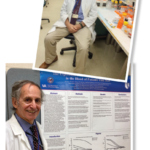
Dr. Parris
Sometimes, late at night, after his wife Carla has gone to bed, Glenn Parris, MD, rheumatologist, founder and CEO of Parris and Associates Rheumatology, Lawrenceville, Ga., sneaks into his home office to continue working on one of his novels.
“My wife thinks I’m asleep, but I use the time to compose my thoughts and write a couple of chapters,” Dr. Parris says. “I try to write for a couple of hours every weekend, and also in airports and hotel rooms when I’m traveling.”
A Story Begins
Dr. Parris’ love for the written word began when he was a young boy growing up in New York City. An avid reader who spent hours devouring science fiction novels, he counts Isaac Azimov, Frank Herbert, Octavia Butler and Larry Niven among his favorite authors. His passion for the written word grew over the years to include a love of writing.
While completing his fellowship at Emory University School of Medicine in Atlanta, Dr. Parris began writing stories based on the genres he enjoyed reading the most, including science fiction, fantasy and suspense/thriller mysteries.
“At the time, I was writing for pleasure,” Dr. Parris says. “The more I wrote, the more I learned that every draft didn’t have to be perfect. It was more important to just keep writing.”
Write What You Know
After moving cross-country from Buffalo, N.Y., to complete his medical residency and rheumatology fellowship at Emory University, Dr. Parris fell in love with the Atlanta suburbs. He put his writing on hold as he proceeded to get married, have two children and build a burgeoning rheumatology practice.
It wasn’t until 2010 that Dr. Parris began to contemplate publishing a novel when his wife gave him a gift, enrolling him in a writing workshop for doctors led by novelists and retired physicians Tess Gerritsen and the late Michael Palmer.
Aspiring writers often hear the phrase, “Write what you know,” and as he penned his first book, The Renaissance of Aspirin, a Jack Wheaton Mystery Doc novel, published in 2013, Dr. Parris found his scientific outlook influenced his writing.
‘The more I wrote, the more I learned that every draft didn’t have to be perfect. It was more important to just keep writing.’
—Dr. Parris
“The story is a medical mystery based in Atlanta that centers around two young doctors who unwittingly possess a cure for fibromyalgia,” Dr. Parris says. “The idea for this book was conceived in part because of my frustration that we haven’t made the same strides with understanding and treating fibromyalgia as we have with rheumatoid arthritis and other inflammatory diseases.”
His first book received positive reviews from readers who praised his “unique blend of deft storytelling and medical know-how.” In 2017, Dr. Parris published a novella, Unbitten: A Vampire Dream, followed by his second novel, Dragon’s Heir: The Archeologist’s Tale, in 2018. In Dragon’s Heir, Dr. Parris takes a turn into the world of science fiction/fantasy, exploring what might have transpired if humanoid dinosaurs returned to Earth only to find it inhabited by humans.
Afrofuturism
Dr. Parris is considered an expert in Afrofuturism, a cultural movement that combines science fiction and fantasy, reflecting the experiences of the African diaspora. One of the most recent examples of Afrofuturism is the Black Panther movie, featuring the late actor Chadwick Boseman and based on the popular Marvel comic series set in the fictional kingdom of Wakanda.
When Dr. Parris learned Marvel was publishing an anthology of stories from the African diaspora, titled Black Panther: Tales of Wakanda, he submitted a story for consideration. The anthology, released in 2021, includes Dr. Parris’ story, The Underside of Darkness.
“My earliest memories of reading science fiction began with comic books when I was around 8 years old,” Dr. Parris says. “I had a preference for Marvel comics because they had a more intriguing story structure.”
Dr. Parris’ most recent novel, Dragon’s Heir (The Efilu Legacy), a blend of science fiction and fantasy, was published in May 2022.
“When I write, I like to cast the characters in my head as if I were casting a movie,” he says. “I want them to be three-dimensional and relatable to readers.”
Dr. Parris is currently working on a sequel to The Renaissance of Aspirin. He says that over the years, his writing style has matured and it now takes him six months to a year to finish writing a novel.
“I don’t have a degree in literature, so I stumbled a little early on in my writing career,” he admits. “The stories were good, but I had an awkward writing style.”
He also learned that although he can’t be an expert in everything, he can tap into the expertise of others.
“I have a former employee who went to work with the state department, and their vetting process included an interview with me. The person who interviewed me knew I was a writer, which told me that he had investigated my background before he interviewed me. He was very helpful in answering some questions about espionage and told me if I ever needed a consultant for a future novel he would be happy to offer his experience,” Dr. Parris says. “That agent was one of the most interesting characters I’ve ever met.
“When I’m working on developing characters for a new novel, I’ve found that many of my best ideas come from people watching.”
Advice for Aspiring Writers
For other rheumatologists who are aspiring writers, Dr. Parris says his best advice is: “Write the book you want to read.”
“Tell the story in your voice, develop your story and complete your first draft,” Dr. Parris says. “When you’re done, work on refining your first draft with help from an editor or a writer’s critique group.”
To learn more about Dr. Parris and his novels, visit glennparris.com.
 Linda Childers is a health writer located in the San Francisco Bay Area.
Linda Childers is a health writer located in the San Francisco Bay Area.



